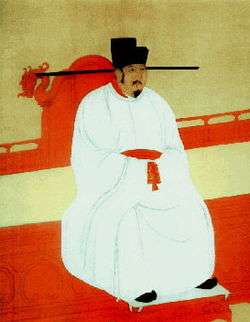Emperor Yingzong of Song
| Emperor Yingzong of Song 宋英宗 | |||||||||||||
|---|---|---|---|---|---|---|---|---|---|---|---|---|---|
|
| |||||||||||||
| Emperor of the Song dynasty | |||||||||||||
| Reign | 1 May 1063 - 25 January 1067 | ||||||||||||
| Predecessor | Emperor Renzong | ||||||||||||
| Successor | Emperor Shenzong | ||||||||||||
| Born |
Zhao Zongshi (1036–1062) Zhao Shu (1062–1067)[lower-alpha 1] 16 February 1032[lower-alpha 2] | ||||||||||||
| Died | 25 January 1067 (aged 34) | ||||||||||||
| Empress | Empress Gao | ||||||||||||
| Concubines |
Consort Bao Consort Zhang | ||||||||||||
| Issue |
| ||||||||||||
| |||||||||||||
| House | House of Zhao | ||||||||||||
| Father | Zhao Yunrang | ||||||||||||
| Mother | Lady Ren | ||||||||||||
| Emperor Yingzong of Song | |||||||
| Chinese | 宋英宗 | ||||||
|---|---|---|---|---|---|---|---|
| Literal meaning | "Excellent Ancestor of the Song" | ||||||
| |||||||
| Zhao Shu | |||||||
| Traditional Chinese | 趙曙 | ||||||
| Simplified Chinese | 赵曙 | ||||||
| |||||||
| Zhao Zongshi | |||||||
| Traditional Chinese | 趙宗實 | ||||||
| Simplified Chinese | 赵宗实 | ||||||
| |||||||
Emperor Yingzong of Song (16 February 1032 – 25 January 1067), personal name Zhao Shu, was the fifth emperor of the Song dynasty in China. His original personal name was Zhao Zongshi but it was changed to "Zhao Shu" in 1062 by imperial decree. He reigned from 1063 to his death in 1067. He was succeeded by his eldest son, Emperor Shenzong.
In 1055, Emperor Yingzong's predecessor, Emperor Renzong, became critically ill and started to worry about having no successor because his sons all died prematurely. Acting on the advice of his ministers, Emperor Renzong agreed to bring two of his younger male relatives into his palace. One of them was the future Emperor Yingzong, who was eventually chosen and designated as the Crown Prince. Emperor Yingzong was the 13th son of Zhao Yunrang (趙允讓; 995–1059), who was a first cousin of Emperor Renzong and was posthumously known as "Prince Yi of Pu'an" (濮安懿王). Emperor Yingzong's grandfather, Zhao Yuanfen (趙元份; 969–1005), was a younger brother of Emperor Renzong's father, Emperor Zhenzong, and was posthumously known as "Prince Jing of Shanggong" (商恭靖王). Emperor Yingzong's mother, whose maiden family name was Ren (任), was the third wife of Zhao Yunrang. She held the title "Xianjun[lower-alpha 3] of Xianyou" (仙遊縣君).
Emperor Yingzong's empress consort was Empress Gao. As Emperor Yingzong was sickly, Emperor Renzong's widow, Empress Dowager Cao, served as his regent.
Emperor Yingzong's reign is known for controversy over the correct rituals to be performed by the emperor for his father. Emperor Yingzong had been adopted by Emperor Renzong, so Emperor Renzong was nominally Emperor Yingzong's father. However, biologically, Zhao Yunrang was Emperor Yingzong's father. Some officials suggested that Emperor Yingzong honour his biological father with the title "Imperial Uncle", but the emperor agreed with Ouyang Xiu and others and decided to honour his biological father as his parent. This was not only an early sign of more conflict during Emperor Xiaozong's reign but also the Great Rites Controversy of the Ming dynasty.
See also
- List of emperors of the Song dynasty
- Architecture of the Song dynasty
- Culture of the Song dynasty
- Economy of the Song dynasty
- History of the Song dynasty
- Society of the Song dynasty
- Technology of the Song dynasty
Notes
- ↑ Had his name changed to "Zhao Shu" in 1062 when he was officially designated as the Crown Prince. This name became his official name when he ascended the throne in the following year.
- ↑ Dates given here are in the Julian calendar not the proleptic Gregorian calendar.
- ↑ Xianjun was a title literally meaning "first lady of the county," which was given to the wives of a certain category of Chinese civil servants in imperial times.
References
- Toqto'a, ed. (1343). History of Song. Volume 13: Biography of Emperor Yingzong.
| Emperor Yingzong of Song Born: 16 February 1032 Died: 25 January 1067 | ||
| Regnal titles | ||
|---|---|---|
| Preceded by Emperor Renzong |
Emperor of the Song Dynasty 1063–1067 |
Succeeded by Emperor Shenzong |
